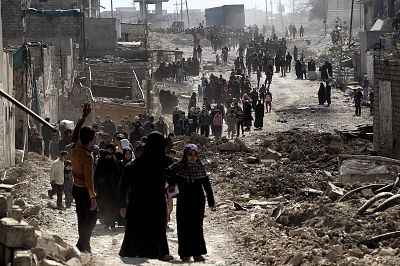Oxfam warns that if the heightened security concerns continue, some 100,000 vulnerable people could be affected.
Vital humanitarian work in Iraq has been halted by the ongoing conflict between the United States and Iran, stopping thousands of refugees and residents in war-torn areas receiving aid.
Oxfam, which works in some of the hardest-to-reach areas of Iraq, said it had stopped delivering aid in the form cash to three locations there since Iran's missile strike Wednesday in retaliation for thekilling of Gen. Qassem Soleimani in a U.S. drone strike.
Oxfam said that if the resulting heightened security concerns, checkpoints and travel difficulties continue, some 100,000 vulnerable people could be affected.
The stark warning comes as voices in Iraq and in the international community continue to call for the fight against the Islamic State group in Iraq to resume, after the U.S.-led coalition dedicated to fighting the terrorists switched its attention to protecting U.S. bases after Soleimani's death.
"As far as possible, we will try to keep our humanitarian work going with our partners around the country," said Oxfam's Country Director in Iraq, Andres Gonzalez Rodriguez.
"However, we have had to relocate some staff and we are keeping all our staff, partners and work under close observation due to the heightened security concerns."
Gonzalez said that a large part of the charity's work in the country involves helping the 1.5 million people still displaced internally by the war against ISIS. In total, an estimated 5.3 million were forced from their homes during the struggle but not all have returned.
With 13 local partners. Oxfam operates 26 programs in five Iraqi governates — Diyala, Kirkuk, Ninewa, Anbar and Salahaddin — specializing in sanitation, emergency food, gender programs and helping shield civilians from ongoing violence. Currently, Oxfam's seven offices are closed and all 250 staff are working from home to avoid travelling.
"All parties to this conflict are obliged to work hard to deescalate the crisis and to build peace in order to spare the Middle East region further humanitarian suffering," Gonzalez said.
"The impacts of another regional conflict on tens of millions of civilians in the Middle East and beyond will be catastrophic and push an overburdened humanitarian system to breaking point."
Staff at Oxfam's office in Irbil, in northern Iraq, is 1.8 miles away from where one of Iran's missiles struck an air base — close enough for staff to hear the rockets and see the impact.
Meanwhile, the pause in the international coalition fighting ISIS in Iraq poses a threat to the security of multiple disputed regions, politicians and terrorism experts are warning.
"The decision to suspend anti-ISIS operation by the U.S.-led coalition will negatively impact areas disputed between Kurdistan Region and Iraq's central government," said Jwan Rozhbayani, head of the Disputed Territories Committee, according to Kurdistan 24.
On Sunday, U.S.-led coalition Operation Inherent Resolve said its focus would be protecting American bases and that imminent attacks from Iran had "limited our capacity to conduct training with partners and to support their operations against [ISIS]."
There are around 6,000 U.S. troops still in Iraq, alongside a coalition of soldiers from some 20 nations and NATO, primarily tasked with training the Iraqi military — but questions have been raised over their presence after Iraq's Parliament passed a motion for those troops to leave.
Brett McGurk, a former U.S. special envoy for countering ISIS, told NPR on Wednesday that the removal of U.S. forces could create a vacuum that both Islamist terrorists and Russia could exploit.
"It wasn't very long ago you used to see 50, 60 car bombs, suicide bombs, a month in Iraq, and ISIS wants to reconstitute those networks. And as they do, that's how they carve out a safe space and then begin to target the West again," he said.
"It's a very, I think, smart, sustainable presence. And without us, I think it'd be very difficult to keep the pressure on those networks."












